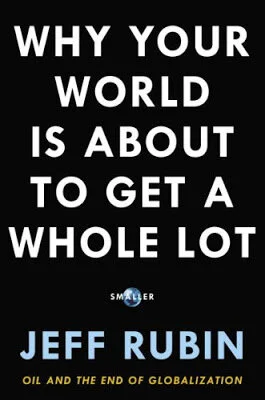I haven't had a chance to read this book but the description sums up enough for me:
Jeff Rubin
For more than 20 years, Jeff Rubin has been known as one of Canada’s top economists, and a major voice for the energy sector. In Why Your World Is About to Get a Whole Lot Smaller, Rubin uses that background to project what our world will look like in the near future, as oil reserves dwindle and global economies suffer. This book is not aimed at economists and money managers, though. It speaks directly to the average reader, and should serve as a dire warning of the severe consequences of oil dependency in our everyday lives.
With its central argument that a combination of rapidly dwindling oil supply and ever-increasing oil dependence will cause a continuing cycle of worsening recessions and depressions, this book projects a bleak future.
As transportation and environmental costs increase due to high oil prices and carbon regulation, Rubin argues, international trade will dry up and the age of globalization will end. The resulting fallout will force governments and businesses to create and support localized economies, and eschew international trade and transport.
In the tradition of writers like George Monbiot and Sir Nicholas Stern, Rubin presents some difficult truths that readers may find intimidating. Dense with statistics pointing to the inevitable collapse of the world as we know it, this book may not be an encouraging read.
Unlike Monbiot and Stern, who put forth a plan to slow the collapse, Rubin’s focus remains squarely on preparing readers for the kind of world that is coming, rather than trying to slow that inevitable outcome.
In a world where consumption in developed countries shows little sign of slowing and oil usage is skyrocketing, we need someone with Rubin’s background to predict what the likely results will be. Rubin’s perspective clearly falls more into the realm of futurism than economics, but because he excels at taking complex economic data and applying them to the everyday lives of his readers, this book functions successfully as both explanation and warning.
Rubin is sure to incite controversy with some of the central ideas in this book, but given that the world he envisions seems increasingly likely to materialize, Why Your World Is About to Get a Whole Lot Smaller could turn out to be the exactly the book that readers are looking for, or that they need.
What do subprime mortgages, Atlantic salmon dinners, SUVs and globalization have in common?
They all depend on cheap oil. And in a world of dwindling oil supplies and steadily mounting demand around the world, there is no such thing as cheap oil. Oil might be less expensive in the middle of a recession, but it will never be cheap again.
Take away cheap oil, and the global economy is getting the shock of its life.
From the ageing oilfields of Saudi Arabia and the United States to the Canadian tar sands, from the shopping malls of Dubai to the shuttered auto plants of North America and Europe, from the made-in-China products on the shelves of the Wal-Mart down the road to the collapse of Wall Street giants, everything is connected to the price of oil
Interest rates, carbon trading, inflation, farmers’ markets and the wave of trade protectionism washing up all over the world in the wake of various economic stimulus and bailout packages – they all hinge on the new realities of a world where demand for oil eventually outstrips supply.
According to maverick economist Jeff Rubin, there will be no energy bailout. The global economy has suffered oil crises in the past, but this time around the rules have changed. And that means the future is not going to be a continuation of the past. For generations we have built wealth by burning more and more oil. Our cars, our homes, our whole world has been getting bigger in the cheap-oil era. Now it is about to get smaller.
There will be winners as well as losers as the age of globalization comes to an end. The auto industry will never recover from this oil-induced recession, but other manufacturers will be opening up mothballed factories. Distance will soon cost money, and so will burning carbon – both will bring long-lost jobs back home. We may not see the kind of economic growth that globalization has brought, but local economies will be revitalized, as will our cities and neighborhoods.
Whether we like it or not, our world is about to get a whole lot smaller.
